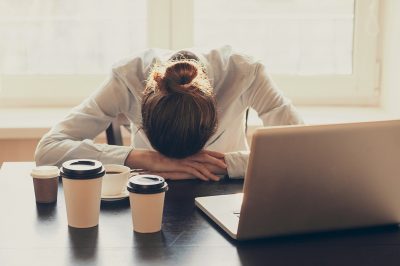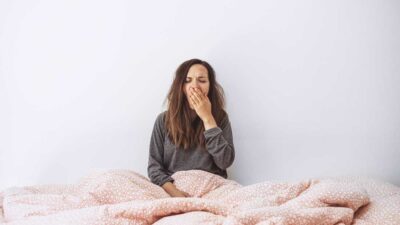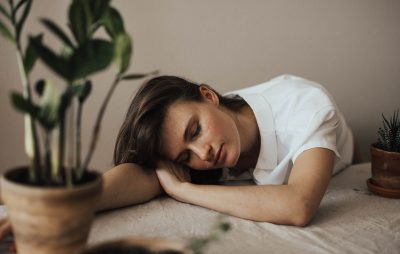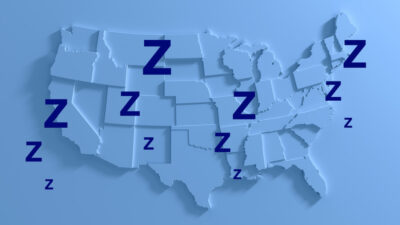Sleep Deprivation: Symptoms, Causes, Risk Factors, and Treatments
- by Sharon Brandwein
- Updated: September 7, 2023
Table of Contents

Sleep deprivation simply means that you’re not getting enough sleep. From that definition, we’d venture to guess that 100 percent of the population has experienced sleep deprivation at some point in their lives. When you factor in things like work stress, life stress, new babies, illness, pain — you name it, all of the above can affect your sleep and ultimately lead to sleep deprivation. And while a sleepless night here or there is just part of being human, prolonged sleep deprivation can have significant and adverse effects on your health. The side effects of sleep deprivation can range from minor annoyances like daytime sleepiness and irritability to more serious health conditions, obesity, diabetes, heart disease, and stroke.
How Much Sleep Do You Need?
According to The American Academy of Sleep Medicine, “the amount of sleep you need depends on your age,” and they share the following guidelines.
- Infants 4 months to 12 months should sleep 12 to 16 hours per 24 hours (including naps).
- Children 1 to 2 years of age should sleep 11 to 14 hours per 24 hours (including naps).
- Children 3 to 5 years of age should sleep 10 to 13 hours per 24 hours (including naps).
- Children 6 to 12 years of age should sleep 9 to 12 hours per 24 hours.
- Teenagers 13 to 18 years of age should sleep 8 to 10 hours per 24 hours.
- Adults should sleep 7 or more hours per night.
A good rule of thumb is that children and teenagers need more sleep than adults. And while most people mistakenly believe that someone in their 70s or 80s needs less sleep, they really need the same amount of sleep they needed 20 or 30 years prior. Unfortunately, our sleep quality and quantity often takes a hit as a matter of course in aging. Illness, pain, and frequent nighttime bathroom trips can deliver a pretty big blow to our sleep quality and quantity.
“Lifestyle choices can also affect how much sleep we need,” says Dr. Harold Hong, a board-certified psychiatrist at New Waters Recovery. “For example, people with active lifestyles or jobs requiring them to be physically active often need more rest than sedentary people. Similarly, people with stressful jobs or lives may also need more sleep to cope with the added stress.”
Hong tells Sleepopolis that in addition to age and lifestyle, “our health can also affect how much sleep we need. Healthy people generally require less sleep than people who have chronic health conditions, and people recovering from an illness or injury may need more sleep to heal properly.”
What Causes Sleep Deprivation?
While scientists are still trying to clearly define the purpose of sleep, research has given us plenty to work with thus far. Above all else, the science shows us that sleep is crucial for our overall health and wellness. In fact, there’s plenty of evidence to suggest that insufficient sleep leads to a host of adverse physical and mental health issues.
Yet research shows that people regularly fall short of their sleep requirements. Current statistics show that one in three adults are not getting enough sleep on a regular basis. So what’s keeping us up at night and causing sleep deprivation?
According to Hong, stress and anxiety, work-related stress, and shift work are common causes of sleep deprivation. If that weren’t plenty, medical conditions such as insomnia, sleep apnea, or narcolepsy could also lead to sleep deprivation.
Stress
Stress can easily detract from the quantity and quality of your sleep. Not only has research shown that stress can delay sleep latency (the amount of time it takes you to fall asleep), but it can also lead to sleep fragmentation and reduce the amount of slow-wave sleep you have. (Slow-wave sleep is the most restorative sleep stage and most commonly tied to sleep quality and maintenance.)
Anxiety
Sleep deprivation is usually par for the course for anyone dealing with anxiety on a regular basis. Like stress, anxiety also delays sleep latency and can lead to fragmented and poor-quality sleep. It’s also worth noting that anxiety and sleep deprivation have a cyclical relationship. Not only can anxiety cause sleep deprivation, but sleep deprivation can lead to or worsen anxiety and anxiety disorders. Moreover, research also shows that those prone to anxiety are even more sensitive to the effects of sleep deprivation, further provoking their anxiety.
Lifestyle/Work
Any new parent can tell you that the arrival of a new baby also marks the end of sleep as you know it. Between diaper changes, frequent feedings, and a nonexistent circadian rhythm, fragmented sleep and sleep deprivation are the rules, not the exception, for new parents. And in case you were wondering, research shows that your shut-eye won’t return to normal until somewhere around six years after the birth of your first child.
Like new parents, night shift workers are also prime candidates for sleep deprivation. In this case, disruptions to normal sleep/wake cycles and altered rest/activity patterns often come together, forming the perfect storm for sleep deprivation.
Medication
Medications often come with a long list of side effects. Chances are if you look closely at the fine print in the paperwork, you might find sleep disruptions listed somewhere.
Medications commonly associated with sleep deprivation include
- Heart medications (specifically, anti-arrhythmic drugs)
- Beta Blockers for high blood pressure
- Asthma medications (Theophylline)
- Antidepressants (Selective serotonin reuptake inhibitors like fluoxetine, aka Prozac)
- Nicotine patches
- ADHD medications (Ritalin)
Sleep Disorders
Understandably, sleep disorders that impair sleep, like insomnia, sleep apnea, restless leg syndrome, and narcolepsy can lead to sleep deprivation.
Other Common Causes of Sleep Deprivation
- Illness. If you’ve ever had the flu or a common cold, then you know illness can keep you up at night. This, in turn, can provoke sleep deprivation.
- Poor sleep hygiene. Personal habits such as drinking caffeine in the hours leading up to bedtime, smoking cigarettes, failing to manage stress, or exercising right before bed can all make it less likely that you’ll fall asleep quickly enough to enjoy adequate amounts of sleep.
- Poor sleeping environment. If your bedroom is noisy, bright, or excessively hot or cold, that’s going to inhibit your ability to sleep through the night. Same goes for anyone who sleeps next to or near a person who regularly snores in their sleep.
- Pregnancy. The hormonal and physiological changes associated with pregnancy may interfere with a person’s ability to get a good night’s sleep, which can lead to sleep deprivation.
Side Effects of Sleep Deprivation
In short, the side effects of sleep deprivation range from sleepiness and irritability to more serious health consequences like obesity, diabetes, dementia, heart disease, and stroke.
Short-Term Effects of Sleep Deprivation
“In the short term, sleep deprivation can [lead to] fatigue, irritability, and difficulty concentrating because your brain is not getting the rest it needs to function properly,” says Hong. Moreover, sleep deprivation makes it hard to focus and pay attention, so anyone dealing with its effects may likely see a deleterious impact on their work performance or grades in school. Hong also notes that sleep deprivation can lead to accidents while driving “due to impaired judgment and reaction time.”
Common side effects of short-term sleep deprivation include
- Daytime sleepiness
- Lack of alertness
- Moodiness and irritability
- Fatigue
- Impaired memory – poor sleep quality and sleep deficits are known to impair the memory consolidation process that typically occurs while we sleep. Researchers believe this is a result of a buildup of specific proteins in the brain known as beta-amyloid proteins. In mouse and human models, a buildup of beta-amyloid proteins is linked to sleep deprivation, and in humans, beta-amyloid deposits are linked to poor memory function and an increased risk of dementia.
Long-Term Effects of Sleep Deprivation
“In the long term, sleep deprivation can lead to more serious health problems, such as obesity, heart disease, stroke, and diabetes,” says Hong. “It can also cause cognitive impairments, such as memory loss and difficulty thinking clearly.” Sleep deprivation can also worsen mental health conditions such as anxiety and depression.
Common side effects of long-term sleep deprivation include:
- Dementia
- High blood pressure
- Diabetes
- Heart attack
- Heart disease
- Stroke
Who Is At Risk for Sleep Deprivation?
Sleep deprivation can affect people of all ages, ethnicities, genders, races, and so on. That being said, certain people may be more at risk for sleep deprivation if they experience any of the following:
- Limited time for sleeping, such as among people who work long hours and/or are responsible for caring for a young child or sick relative
- Any of the medical conditions listed in the “causes of sleep deprivation” and “risk factors for sleep deprivation” sections above
- An uncomfortable bedding situation, such as a mattress that doesn’t provide adequate support
- Use of any of the medications listed in the preceding sections
- Undiagnosed or untreated psychological conditions such as anxiety, depression, and/or stress
- Schedules that make it challenging to adopt a sleep schedule that’s in line with their personal body clock, such as shift work, working as a first responder, frequent travel, or needing to wake up exceptionally early for school or work
- Lifestyle choices such as drinking copious amounts of caffeine, smoking cigarettes, staying up late, or not scheduling enough time for sleep
How Is Sleep Deprivation Diagnosed?
If you’re experiencing any or several of the symptoms of sleep deprivation — especially if those symptoms are chronic or long-term — it may be time to consult a doctor. They’ll be able to assist you in the diagnosis of sleep deprivation or determine another cause for your symptoms.
One of the symptoms that is especially likely to result in a sleep deprivation diagnosis is daytime sleepiness. Other signs that your doctor may pay attention to include a prolonged period of poor sleep, falling asleep within a few minutes of lying down, falling asleep during inopportune times, or experiencing the “microsleeps.”
Your doctor may ask you detailed questions about these symptoms and other factors that may be contributing to your fatigue. They may also ask you to develop a written sleep log so they can better understand your symptoms and contributing factors.
The doctor may be able to dispense a diagnosis and treatment options on their own, or they may refer you to a sleep specialist. The sleep specialist may conduct further examinations to develop a better sense of your sleep deprivation, its underlying causes, and possible treatments.
Sleep Tips for Preventing Sleep Deprivation
Just as there is no singular cause of sleep deprivation, there is no singular fix. In many cases, however, lifestyle changes and adjustments to your sleep hygiene may help you get your sleep back on track so you can meet your daily requirements.
Practice Good Sleep Hygiene
Good sleep habits (or sleep hygiene) are key to catching your 40 winks every night. In simple terms, sleep hygiene refers to your sleep environment and your daily and nightly habits around sleep.
If you’re struggling with sleep deprivation, here are some good sleep hygiene tips you might consider:
- Switching to (and maintaining) a consistent sleep and wake schedule (this helps to maintain your body’s internal clock or circadian rhythm
- Establishing a consistent bedtime routine (bedtime routines reinforce the idea of bedtime in your head)
- Cutting screen time around bedtime
- Keeping your bedroom cool, quiet, and dark (somewhere around 65 degrees Fahrenheit is optimal
- Limiting daytime naps
Additionally, there are some lifestyle changes you can make that may help you nip any sleep deprivation symptoms in the bud.
Catch Some Rays
Just as maintaining a consistent sleep and wake schedule reinforces your body’s internal clock, so does exposure to sunlight. Light plays a key role in regulating your circadian rhythm, and while it may seem strange, getting out into the sun can help you sleep better at night.
Exercise Regularly
While we know that exercise can do the heavy lifting to reduce your risk of obesity, heart disease, and cancer, research shows that exercise can also do the heavy lifting to improve your sleep. It’s worth noting that if exercise becomes your weapon of choice against sleep deprivation, it’s best not to exercise too close to bedtime. Thirty minutes of moderate exercise in the morning or afternoon is ideal.
Mind Your Diet
While your diet may not be the first thing that comes to mind when you’re trying to pinpoint why you’re tossing and turning at night, it probably should be.
Your diet can have a profound effect on your sleep quality and quantity. So, if you feel like you’re battling the effects of sleep deprivation more often than you’d like, you might think about making some changes to your food and beverage intake, particularly before bed. If you’re hungry close to bedtime, skip the heavy meal and try a sleep-promoting snack instead.
Like foods, your beverage choices matter too. Alcohol, for example, may make you feel drowsy come bedtime, but it’ll lead to a worse night’s sleep in the long-run thanks to frequent nighttime awakenings and the fact that your favorite nightcap may make it harder for your body to enter the REM sleep stage.
On the flip side, caffeine works as a stimulant that keeps your body feeling awake and energized — indulge too close to bed, and you may be adding it to your list of reasons you struggle to sleep at night.
Resist the Urge to Clock-Watch
When you’ve got somewhere to be or something to do the next morning, clock-watching when you can’t sleep is completely understandable. And while it might be an incredibly hard habit to break, consider this: studies show that clock-watching may worsen insomnia and exacerbate your misperception of sleep.
The Last Word from Sleepopolis
Sleep deprivation is not a sleep disorder, but it can still have serious ramifications for a person’s health and quality of life. If you feel that you’re sleep deprived, the best antidote is to get more sleep using some or all of the strategies outlined above. If that doesn’t cut it, then it may be time to consult a medical professional. Don’t give up until you’re getting adequate amounts of sleep on a regular basis; your well-being depends on it.
Subscribe Today!
Get the latest deals, discounts, reviews, and giveaways!



